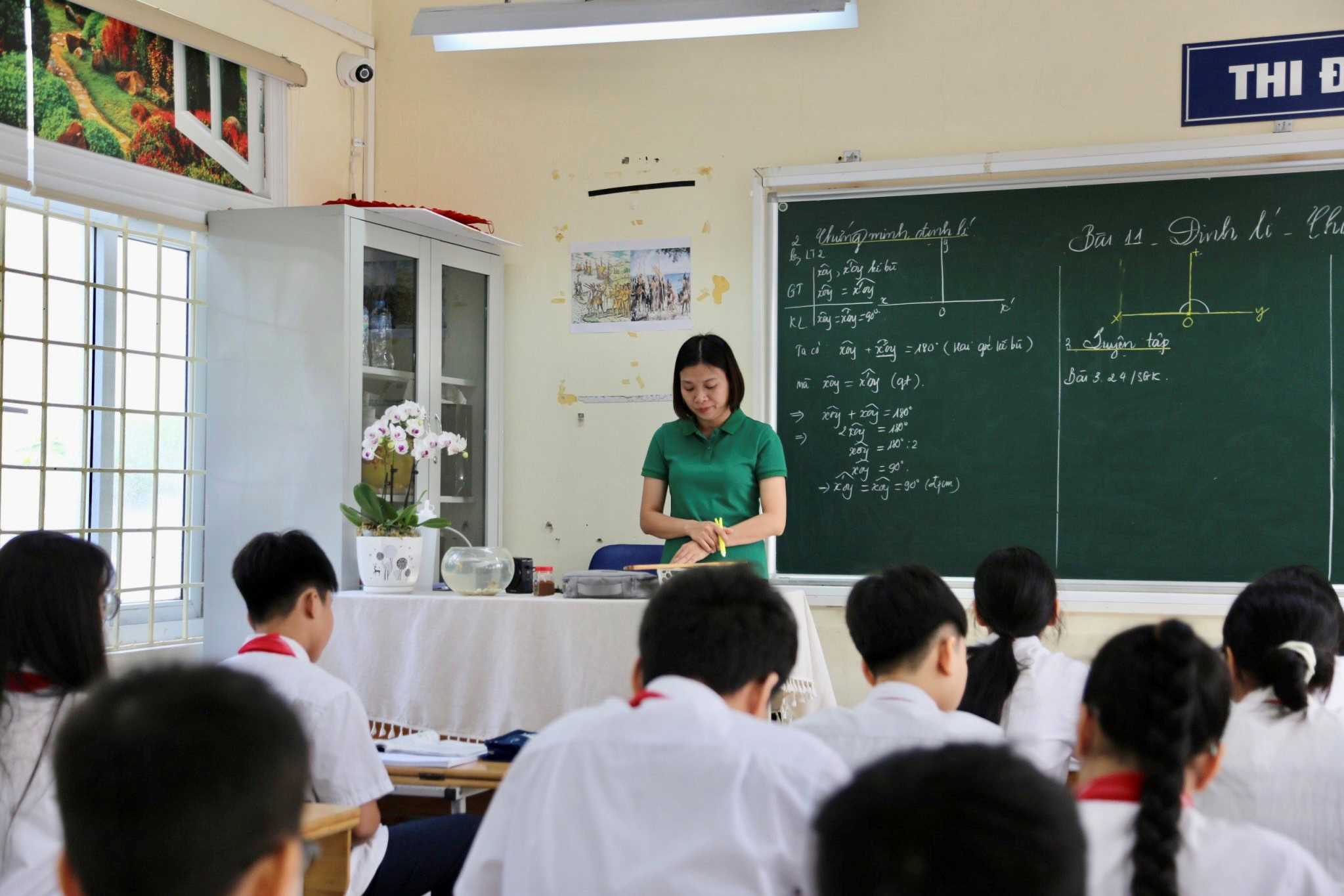Proposal to rank teachers' salaries as highest
Ms. Nguyen Thi Hong Hanh - a teacher in Dak Lak province - has worked in the education sector for more than 9 years. Before July 1, 2024, Ms. Hanh's monthly salary was only about 6 million VND. Currently, with the increase in the basic salary, Ms. Hanh's monthly salary has improved compared to before, but it is still difficult to "live on salary".
Therefore, to make a living, like many other colleagues, in addition to teaching, Ms. Hanh also sells products online. "Working from morning to night every day, I don't have time to take care of my small family" - Ms. Hanh shared.
When hearing the news that teachers' salaries will soon be given the highest priority in the salary scale system when the Law on Teachers is promulgated, Ms. Hanh could not hide her joy and confided that a salary increase has been a long-standing wish of her and other teachers. "The upcoming salary reform policy and Law on Teachers will create a great motivation for teachers to feel secure in their work and devote themselves to their profession; at the same time, it will be a source of attraction for young teachers, teachers with good professional expertise who are passionate about the profession of educating people" - Ms. Hanh confided.
The Draft Law on Teachers has many new points, including salary and benefits policies. Accordingly, teachers' salaries are ranked highest in the administrative career salary scale system; there is a priority regime in salary and allowance regime higher than other teachers for preschool teachers; working in particularly difficult areas in ethnic minority areas, mountainous areas, coastal areas and islands; specialized schools, other specialized schools; implementing inclusive education; being ethnic minorities and teachers in some specific professions; Teachers recruited and having their salaries increased by 1 salary level in the administrative career salary scale system.
The retirement age of teachers has its own regulations in accordance with the characteristics of their professional activities. In particular, teachers in preschools, if they wish, can retire at a lower age but not more than 5 years older than the regulations and will not have their pension rate deducted due to early retirement. Teachers with the title of professor, associate professor or doctoral degree and teachers working in specific specialized fields and sectors are entitled to retire at a higher age.
Associate Professor Dr. Nguyen Van Trao - Vice Principal of Hanoi National University of Education - acknowledged that the Law on Teachers is expected to help teachers feel secure in their work, while at the same time, a suitable salary will attract good pedagogical students to stick with and contribute to the education sector.

Untangling the problem of teacher surplus and shortage
The Law on Teachers is expected to adjust regulations on teacher management towards unifying State management of teachers in the entire system while strengthening decentralization, affirming the position and role of State management of the Education sector (especially for preschool and general education levels) to resolve shortcomings in local surplus/shortage of teachers, proactively regulating teachers on a provincial/national scale.
The draft also gives the education sector the initiative in recruiting and using teachers. In particular, the Ministry of Education and Training and the Ministry of Labor, War Invalids and Social Affairs are the agencies in charge of developing strategies, projects, development plans, and total staffing levels of teachers under their management authority to submit to competent authorities for decision; promulgate recruitment criteria and standards, and pedagogical practice content in teacher recruitment/examination; and coordinate the staffing levels of teachers in public educational institutions according to the number assigned by competent authorities.
Educational management agencies take the lead (or delegate authority to educational institutions) in recruiting, mobilizing, arranging, evaluating, and appointing teachers.
Dr. Pham Do Nhat Tien - former Assistant Minister of Education and Training acknowledged that, besides the outstanding results and advantages of the work of building the teaching staff in recent years, there are still persistent shortcomings in the motivation, capacity and structure of the team in response to the requirements of innovation, especially the shortage of teachers, including both overall shortage and local surplus and shortage.
According to Mr. Tien, there are two basic reasons. One is that the regime and policies on teachers have not been moved in line with the increasing demands on teachers, making the teaching profession lack the necessary attraction. Two is that the State management of teachers has not been innovated to match the new perception of teachers and the teaching profession. Therefore, Mr. Tien supports replacing the personnel management model with the human resource management model as mentioned in the draft Law on Teachers.
Sharing the same view, Prof. Dr. Thai Van Thanh - Director of the Department of Education and Training of Nghe An province - said that the current teacher recruitment process reveals many shortcomings, revealing a number of difficulties and limitations in planning for staff development, selection and management of the teaching staff.
“The planning of the teaching staff needs to be consistent and long-term, ensuring the initiative of educational management agencies at all levels. At the same time, it is necessary to innovate the recruitment and appointment of teachers. Therefore, it is appropriate to assign responsibility and initiative in recruiting and using teachers to educational management agencies,” said Mr. Thanh.
Mr. Le Viet Duong - Principal of Truong Dinh High School (Hoang Mai, Hanoi) - hopes that the Law on Teachers, when promulgated, will have a positive impact on millions of teachers across the country. "When having to struggle to make ends meet, this more or less affects teachers' time and thinking. If salaries are improved, and there are more policies to ensure teachers' income, it will encourage teachers to love their jobs more and contribute more," said Mr. Duong.
Expectations to elevate the status and role of teachers
Speaking with Lao Dong, Mr. Vu Minh Duc - Director of the Department of Teachers and Educational Managers (Ministry of Education and Training) - affirmed that the education sector will be proactive in recruiting, using and developing the teaching staff because there are strong enough legal sanctions to remove bottlenecks in the recruitment and use of teachers in the past, attract talented people to the teaching profession, and retain talented teachers in the profession. From there, improve the quality of the education system on the basis of standardizing the teaching staff.
“For the first time, the legal status of non-public teachers is established as teachers, not just employees under the labor contract mechanism. This creates equality in development opportunities between public and non-public teachers,” said Mr. Duc.
Teachers will be elevated in status and role, recognized, honored and protected by society in their professional activities; career development opportunities will be expanded to help teachers feel secure in their work and motivate them to dedicate themselves to their profession.
T.VAN











